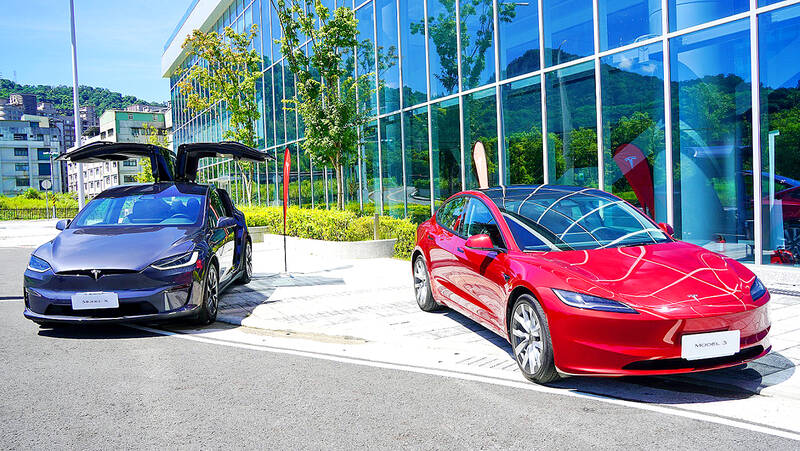New vehicle sales in Taiwan last month dropped 10.1 percent annually to 39,181 units, as demand cooled and new local content rules weighed on market sentiment, auto market researcher U-car said yesterday.
However, on a monthly basis, sales expanded 17.9 percent from October, data showed.
The local vehicle market turned sluggish this year after a massive order backlog was fulfilled last year as automakers overcame component shortages and stepped up production, U-car said, adding that the decline in sales accelerated in the second half of this year.

Photo courtesy of New Taipei City Economic Development Department
The new local content rules, which took effect in August, upended the auto market, with new MG electric vehicles (EVs) being barred from sales and new model introductions being rescheduled.
MG cars are developed by China’s MG Motor Corp and assembled by China Motor Corp (中華汽車) in Taiwan, with a majority of the auto parts imported from China.
During the first 11 months of this year, new vehicle sales contracted 4 percent annually to 416,528 units, U-car said.
Whether full-year sales would be able to grow for a second straight year remains to be seen, as car distributors usually launch promotions later in the year, it added.
Hotai Motor Co (和泰汽車), which dominates the local market with a 36.1 percent share, said it expects new vehicle sales this month to shrink 3 percent year-on-year to 42,000 units, bringing full-year sales to 460,000 units, down 1.3 percent from 466,000 units last year.
Hotai also trimmed its own annual sales by almost 6 percent to 160,000 units from an earlier estimate of 170,000 units, citing insufficient supply from Toyota Motor Corp.
Tesla Inc sold 13,364 units in the first 11 months of this year, maintaining its top position in the electric vehicle market, ahead of Luxgen Motor Co (納智捷汽車), a subsidiary of Yulon Motor Co (裕隆汽車), with 6,620 cars, data showed.
Separately, Sanyang Industrial Co (三陽工業) yesterday announced that it was withdrawing from the Taiwan Transportation Vehicle Manufacturers’ Association (台灣車輛工會).
The government’s sudden adjustments of local content rules and the association’s failure to inform and help members in time have left many unprepared to cope with the changes, a statement issued by Sanyang chairman Wu Ching-yuan (吳清源) said.

MULTIFACETED: A task force has analyzed possible scenarios and created responses to assist domestic industries in dealing with US tariffs, the economics minister said The Executive Yuan is tomorrow to announce countermeasures to US President Donald Trump’s planned reciprocal tariffs, although the details of the plan would not be made public until Monday next week, Minister of Economic Affairs J.W. Kuo (郭智輝) said yesterday. The Cabinet established an economic and trade task force in November last year to deal with US trade and tariff related issues, Kuo told reporters outside the legislature in Taipei. The task force has been analyzing and evaluating all kinds of scenarios to identify suitable responses and determine how best to assist domestic industries in managing the effects of Trump’s tariffs, he

TIGHT-LIPPED: UMC said it had no merger plans at the moment, after Nikkei Asia reported that the firm and GlobalFoundries were considering restarting merger talks United Microelectronics Corp (UMC, 聯電), the world’s No. 4 contract chipmaker, yesterday launched a new US$5 billion 12-inch chip factory in Singapore as part of its latest effort to diversify its manufacturing footprint amid growing geopolitical risks. The new factory, adjacent to UMC’s existing Singapore fab in the Pasir Res Wafer Fab Park, is scheduled to enter volume production next year, utilizing mature 22-nanometer and 28-nanometer process technologies, UMC said in a statement. The company plans to invest US$5 billion during the first phase of the new fab, which would have an installed capacity of 30,000 12-inch wafers per month, it said. The

Taiwan’s official purchasing managers’ index (PMI) last month rose 0.2 percentage points to 54.2, in a second consecutive month of expansion, thanks to front-loading demand intended to avoid potential US tariff hikes, the Chung-Hua Institution for Economic Research (CIER, 中華經濟研究院) said yesterday. While short-term demand appeared robust, uncertainties rose due to US President Donald Trump’s unpredictable trade policy, CIER president Lien Hsien-ming (連賢明) told a news conference in Taipei. Taiwan’s economy this year would be characterized by high-level fluctuations and the volatility would be wilder than most expect, Lien said Demand for electronics, particularly semiconductors, continues to benefit from US technology giants’ effort

‘SWASTICAR’: Tesla CEO Elon Musk’s close association with Donald Trump has prompted opponents to brand him a ‘Nazi’ and resulted in a dramatic drop in sales Demonstrators descended on Tesla Inc dealerships across the US, and in Europe and Canada on Saturday to protest company chief Elon Musk, who has amassed extraordinary power as a top adviser to US President Donald Trump. Waving signs with messages such as “Musk is stealing our money” and “Reclaim our country,” the protests largely took place peacefully following fiery episodes of vandalism on Tesla vehicles, dealerships and other facilities in recent weeks that US officials have denounced as terrorism. Hundreds rallied on Saturday outside the Tesla dealership in Manhattan. Some blasted Musk, the world’s richest man, while others demanded the shuttering of his